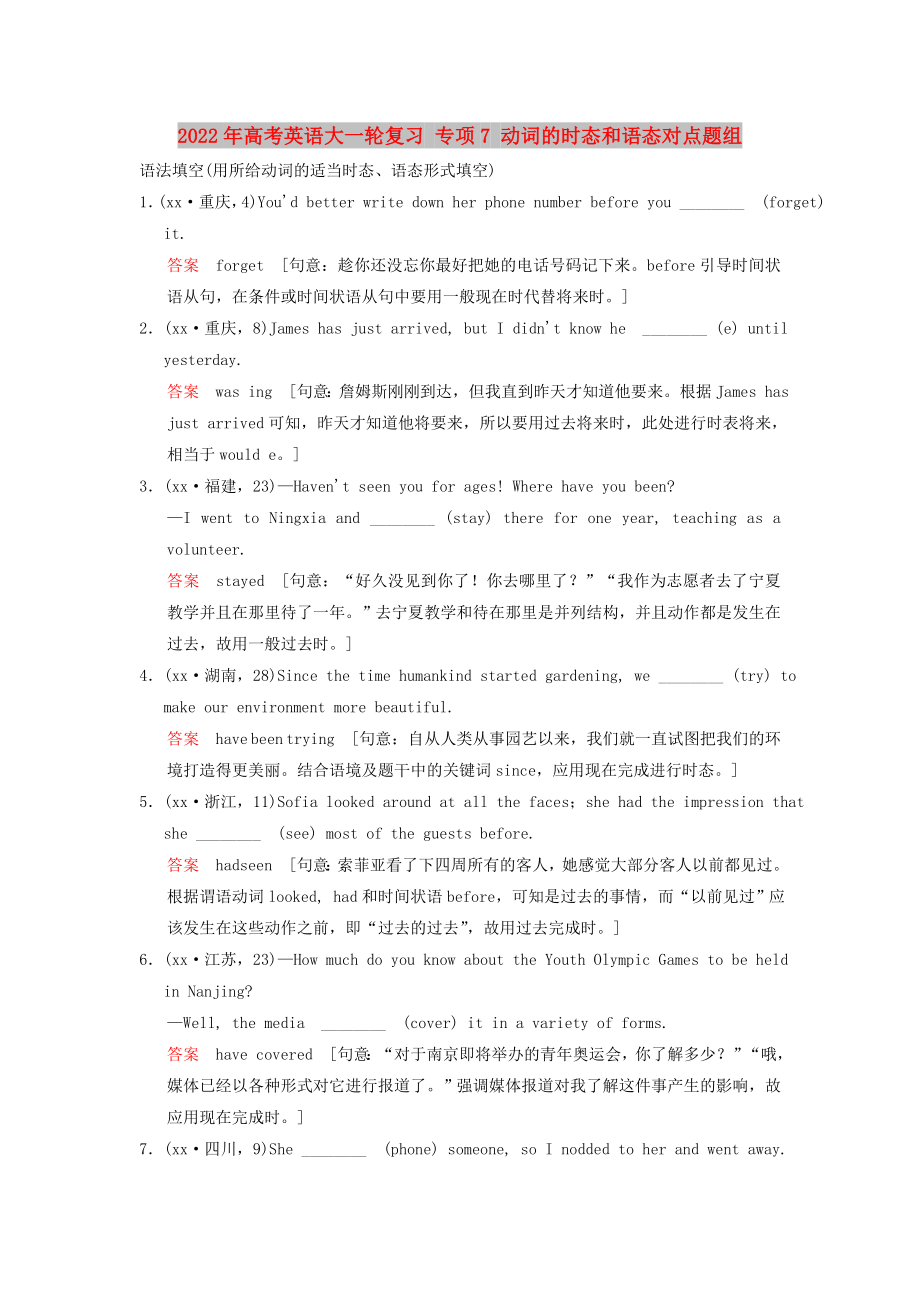《2022年高考英語(yǔ)大一輪復(fù)習(xí) 專(zhuān)項(xiàng)7 動(dòng)詞的時(shí)態(tài)和語(yǔ)態(tài)對(duì)點(diǎn)題組》由會(huì)員分享,可在線閱讀�����,更多相關(guān)《2022年高考英語(yǔ)大一輪復(fù)習(xí) 專(zhuān)項(xiàng)7 動(dòng)詞的時(shí)態(tài)和語(yǔ)態(tài)對(duì)點(diǎn)題組(2頁(yè)珍藏版)》請(qǐng)?jiān)谘b配圖網(wǎng)上搜索���。
1�、2022年高考英語(yǔ)大一輪復(fù)習(xí) 專(zhuān)項(xiàng)7 動(dòng)詞的時(shí)態(tài)和語(yǔ)態(tài)對(duì)點(diǎn)題組
語(yǔ)法填空(用所給動(dòng)詞的適當(dāng)時(shí)態(tài)、語(yǔ)態(tài)形式填空)
1.(xx·重慶����,4)You'd better write down her phone number before you ________ (forget) it.
答案 forget [句意:趁你還沒(méi)忘你最好把她的電話(huà)號(hào)碼記下來(lái)。before引導(dǎo)時(shí)間狀語(yǔ)從句�����,在條件或時(shí)間狀語(yǔ)從句中要用一般現(xiàn)在時(shí)代替將來(lái)時(shí)����。]
2.(xx·重慶��,8)James has just arrived, but I didn't know he ________ (e) until yest
2�����、erday.
答案 was ing [句意:詹姆斯剛剛到達(dá)�����,但我直到昨天才知道他要來(lái)�。根據(jù)James has just arrived可知,昨天才知道他將要來(lái)��,所以要用過(guò)去將來(lái)時(shí),此處進(jìn)行時(shí)表將來(lái)���,相當(dāng)于would e��。]
3.(xx·福建���,23)—Haven't seen you for ages! Where have you been?
—I went to Ningxia and ________ (stay) there for one year, teaching as a volunteer.
答案 stayed [句意:“好久沒(méi)見(jiàn)到你了!你去哪里了���?”“我作為志愿者去了
3�、寧夏教學(xué)并且在那里待了一年����。”去寧夏教學(xué)和待在那里是并列結(jié)構(gòu)�����,并且動(dòng)作都是發(fā)生在過(guò)去��,故用一般過(guò)去時(shí)��。]
4.(xx·湖南�,28)Since the time humankind started gardening, we ________ (try) to make our environment more beautiful.
答案 have been trying [句意:自從人類(lèi)從事園藝以來(lái)����,我們就一直試圖把我們的環(huán)境打造得更美麗����。結(jié)合語(yǔ)境及題干中的關(guān)鍵詞since,應(yīng)用現(xiàn)在完成進(jìn)行時(shí)態(tài)��。]
5.(xx·浙江�,11)Sofia looked around at all the f
4、aces�;she had the impression that she ________ (see) most of the guests before.
答案 had seen [句意:索菲亞看了下四周所有的客人,她感覺(jué)大部分客人以前都見(jiàn)過(guò)����。根據(jù)謂語(yǔ)動(dòng)詞looked, had和時(shí)間狀語(yǔ)before�,可知是過(guò)去的事情,而“以前見(jiàn)過(guò)”應(yīng)該發(fā)生在這些動(dòng)作之前���,即“過(guò)去的過(guò)去”�,故用過(guò)去完成時(shí)��。]
6.(xx·江蘇����,23)—How much do you know about the Youth Olympic Games to be held in Nanjing?
—Well, the
5�、 media ________ (cover) it in a variety of forms.
答案 have covered [句意:“對(duì)于南京即將舉辦的青年奧運(yùn)會(huì)�����,你了解多少��?”“哦���,媒體已經(jīng)以各種形式對(duì)它進(jìn)行報(bào)道了��?����!睆?qiáng)調(diào)媒體報(bào)道對(duì)我了解這件事產(chǎn)生的影響����,故應(yīng)用現(xiàn)在完成時(shí)��。]
7.(xx·四川��,9)She ________ (phone) someone, so I nodded to her and went away.
答案 was phoning [句意:她正在打電話(huà)�,所以我朝她點(diǎn)了點(diǎn)頭就離開(kāi)了�����。根據(jù)so可知��,造成“我朝她點(diǎn)了點(diǎn)頭就離開(kāi)了”的原因是“她正在打電話(huà)���,無(wú)
6、法跟我說(shuō)話(huà)”�,故要用過(guò)去進(jìn)行時(shí)。]
8.(xx·北京���,31)—What time is it?
—I have no idea.But just a minute, I ________ (check) it for you.
答案 will check [句意:“幾點(diǎn)了����?”“我不知道�����。等等�,我?guī)湍憧匆幌?�?!笨幢淼膭?dòng)作還沒(méi)有發(fā)生����,因此選擇將來(lái)時(shí)態(tài)����。]
9.(xx·安徽,30)People are recycling many things which they ________ (throw) away in the past.
答案 would have thrown [句意:人們正在循環(huán)利用許多過(guò)去他們將扔掉的東西�。由in the past可知?jiǎng)幼靼l(fā)生在過(guò)去,表示從過(guò)去某個(gè)時(shí)間看將來(lái)某時(shí)之前已經(jīng)完成的動(dòng)作����,故用過(guò)去將來(lái)完成時(shí)。]
10.(xx·大綱版全國(guó)�,22)Unless some extra money ________(find),the theatre will close.
答案 is found [句意:如果不能多籌集一些錢(qián)�,這個(gè)影院就要關(guān)閉。主句是一般將來(lái)時(shí)�����,unless引導(dǎo)的狀語(yǔ)從句通常用一般現(xiàn)在時(shí)表示將來(lái)���。此處從句中主語(yǔ)money和find之間是被動(dòng)關(guān)系���。]
 2022年高考英語(yǔ)大一輪復(fù)習(xí) 專(zhuān)項(xiàng)7 動(dòng)詞的時(shí)態(tài)和語(yǔ)態(tài)對(duì)點(diǎn)題組
2022年高考英語(yǔ)大一輪復(fù)習(xí) 專(zhuān)項(xiàng)7 動(dòng)詞的時(shí)態(tài)和語(yǔ)態(tài)對(duì)點(diǎn)題組

